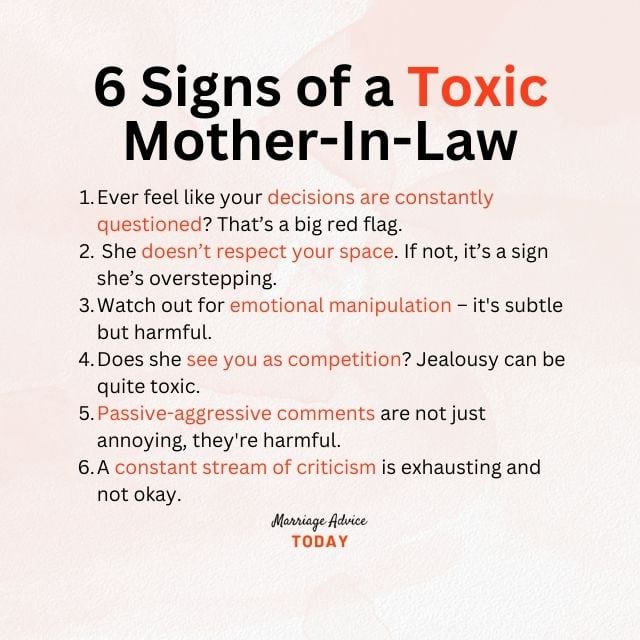How Mother-in-Laws Ruin Marriages: Navigating Troubled Waters
Addressing the critical issue of ‘how mother-in-laws ruin marriages,’ this piece sheds light on the delicate dynamics between couples and intrusive in-laws. It arms readers with effective tools for boundary-setting and conflict resolution, aiming to help those whose marital bliss is shadowed by the challenges of managing a difficult mother-in-law relationship.
The involvement of a mother-in-law in her child’s marriage can sometimes lead to challenging dynamics. When these relationships are characterized by unrealistic expectations or narcissistic tendencies, they can place undue strain on the couple, often leading to stress and conflict. Family members may find themselves caught between opposing forces, exacerbating tension and discord.
To preserve the health of the marital relationship, couples must set clear boundaries with their in-laws. A controlling mother-in-law might try to dictate aspects of your life, undermining the partnership at its core. Addressing these issues head-on is essential in preventing the mother-in-law from negatively impacting the marriage.

This post contains affiliate links which may earn me commissions should you click through them and take certain actions. As an Amazon Associate I earn from qualifying purchases.
Identifying a Problematic Mother-in-Law
Do you ever feel like your mother-in-law is a bit too involved?
Maybe she’s crossing lines or stepping on toes?
Recognizing these signs is the first step to protecting the health of your marriage.
What Constitutes a Toxic Mother-in-Law?
Let’s talk about what makes a mother-in-law toxic.
It’s not just about being nosy or overly opinionated.
It’s when she starts disrespecting your emotional boundaries, takes sides, or creates tension that really impacts your marriage.
6 Signs of Toxic Family Members and Meddling In-Laws
Toxic in-laws, especially an overbearing mother-in-law, can be identified by their persistent interference and lack of respect for personal space within the family dynamic.

1. Undermines Your Decisions
A clear indicator of a problematic mother-in-law is her active undermining of your decisions, particularly in parenting.
By questioning or contradicting the couple’s choices, she not only disrespects their authority but also creates an atmosphere of doubt and insecurity within the family unit.
2. Disrespects Personal Boundaries
A mother-in-law who disregards personal boundaries can strain the couple’s relationship. She may intrude on private moments, offer unsolicited advice, or insert herself into situations where she is not welcome, showing a lack of respect for the couple’s autonomy.
When these boundaries are not honored, it can lead to resentment and a feeling of being suffocated, which is detrimental to the couple’s sense of partnership and independence.
3. Inflicts Emotional Manipulation
Emotional manipulation by a mother-in-law can be subtle yet destructive, leading to guilt and strained relationships. Through emotional coercion, she may attempt to sway decisions or elicit sympathy to align with her desires.
This manipulative behavior can undermine the couple’s confidence in their choices and foster an environment where the mother-in-law’s needs and wants are prioritized over the couple’s well-being.
4. Exhibits Jealous Behavior
A mother-in-law who feels threatened by the woman in her son’s life may exhibit jealous behavior, viewing her as a competition for her son’s attention and affection. This jealousy can manifest in various harmful ways, from subtle comments to overt actions aimed at undermining the daughter-in-law’s position in the family.
Such behavior can create a wedge between spouses, as the son may feel torn between his mother and his partner, leading to unnecessary strife and discomfort.
5. Demonstrates Passive-Aggressive Attitudes
Passive-aggressive attitudes from toxic in-laws are red flags that shouldn’t be ignored. These behaviors can involve snide remarks, backhanded compliments, and intentional oversights that communicate disapproval or discontent indirectly.
When mothers-in-law ruin marriages through such covert tactics, they create an environment of mistrust and hostility. Over time, these patterns can erode the relationship’s foundation, occasionally contributing to marriages ending in divorce.
6. Engages in Constant Criticism and Complaints
A relentless stream of criticism and complaints about the couple’s choices, especially concerning their parenting style, can signal a toxic environment fostered by an overbearing mother-in-law. This constant negativity can sow seeds of self-doubt and unhappiness within the marriage.
When one partner is consistently belittled, the natural response is to become defensive or withdrawn, which can fracture the unity and harmony essential for a healthy marital relationship.
The Impact of a Mother-in-Law’s Toxicity on Marriage Dynamics
Did you know a study from the University of Michigan uncovered some fascinating insights about in-laws and marriage? Over 26 years, Terri Orbuch observed married couples, asking them to rate their closeness with their in-laws. Here’s the kicker: Husbands close to their wife’s parents had a 20% lower chance of divorce. But, for wives close to their husband’s parents, the divorce risk actually increased by 20%! Quite the twist, don’t you think?
Dealing with a challenging mother-in-law can really take a toll on how you and your partner communicate and trust each other. It’s like walking on eggshells, and it can strain even the strongest relationships.
Here’s how mother-in-laws ruin marriages:
Strained Spousal Communication
When a mother-in-law’s behavior causes stress within the marriage, it can lead to strained spousal communication. The couple may find it challenging to discuss issues openly, as conversations about the mother-in-law can become fraught with tension and defensiveness.
Over time, this can lead to a breakdown in communication, making it increasingly difficult for the couple to connect and address problems constructively.
Deteriorating Relationship Trust
The presence of a toxic mother-in-law can erode the trust that is foundational to a strong marital relationship. When a spouse feels that their partner is not defending them against his or her mother’s intrusive behavior, it can create feelings of betrayal and isolation.
Without trust, the partnership becomes vulnerable to misunderstandings and resentment, which can weaken the bond between spouses and lead to the deterioration of the marriage.
Heightened Marital Tensions
Heightened marital tensions are a significant indicator that in-laws affect your marriage negatively. When a mother-in-law persistently undermines a couple’s relationship, it can lead to persistent stress and conflict between spouses. This often manifests as arguments over family gatherings, holidays, or daily routines, where the couple might struggle to find common ground or feel caught in the middle of competing loyalties.
These tensions can escalate when a mother-in-law’s interference challenges the couple’s unity. Whether it’s questioning parenting choices or imposing unsolicited advice, these actions create a wedge that can strain even the strongest bonds. The constant pressure to navigate between spouse and parent can leave individuals feeling exhausted and misunderstood, further exacerbating marital discord.
The Psychology Behind Maternal Interference
Exploring the psychological factors behind maternal interference is key to understanding these complex family dynamics. It often stems from deep-seated emotions and established roles within the family structure that can be difficult to adjust as relationships evolve.
Understanding the Motivations of an Intrusive Mother-in-Law
Intrusive mother-in-laws often act based on various underlying motivations, some of which include:
- Fear of Loss: The fear of losing closeness or being replaced in their child’s life, especially after their child gets married and starts a new family, can lead to over-involvement.
- Desire for Control: Some mother-in-laws have a strong desire to maintain control or influence over family decisions, stemming from their role as a primary caregiver or decision-maker in the past.
- Concern for Child’s Well-being: Out of genuine concern for their child’s welfare, a mother-in-law might become overly involved, believing that their intervention is necessary for their child’s happiness or success.
- Difficulty Adjusting to Change: Difficulty in adapting to the changing dynamics that marriage brings to the family structure can result in a mother-in-law intruding into the couple’s life to retain a sense of familiarity or normalcy.
- Lack of Boundaries: Some mother-in-laws may not understand or respect personal boundaries due to cultural norms, family dynamics, or their own upbringing, leading to intrusive behavior.
- Need for Relevance: A need to feel important, relevant, and needed in their child’s life can drive a mother-in-law to interfere unnecessarily in marital matters.
- Projection of Personal Experiences: Projecting their own marital or life experiences, a mother-in-law might believe they have valuable insights to offer, intruding with advice and opinions even when not sought.
- Loneliness or Emotional Dependency: Feelings of loneliness or emotional dependency, particularly after a spouse’s death or in empty nest scenarios, might lead a mother-in-law to seek more involvement in their child’s life.
Sometimes, understanding why your mother-in-law is so intrusive can help. Maybe she’s feeling left out or is struggling to let go of her role as the primary decision-maker. It’s tough, but understanding this can help you navigate the situation more effectively.
The Effects of Maternal Jealousy and Control on Marital Health
Maternal jealousy and control can deeply affect marital health. When a woman in her son’s life feels threatened by his partner, it can lead to possessive behaviors that undermine the spouse’s position in the family. This dynamic creates an environment of competition rather than cooperation, stressing the couple’s relationship.
Couples face tremendous pressure when dealing with these issues, as they must navigate the complex emotions of a mother-in-law who may feel her role is being usurped. The insistence on maintaining control can stifle the couple’s growth and create an atmosphere of distrust and resentment, which is detrimental to the marriage.
Effective Communication Techniques with Difficult In-Laws
When talking to a difficult in-law, honesty and tact are key. Express your concerns without blame and work with your partner to present a united front. It’s about finding that balance between being respectful and standing your ground.
1. Expressing Concerns Clearly
Expressing concerns clearly to an in-law is a delicate process that requires honesty and tact. It involves addressing specific instances of interference without resorting to generalizations or accusations. A couple can communicate their needs more effectively by focusing on how certain behaviors make one feel rather than blaming the mother-in-law.
This approach helps to foster understanding and can lead to productive discussions about how to move forward. The couple needs to present a united front in these conversations, reinforcing their commitment to each other and the importance of their parenting decisions.
2. Sticking to Agreed Boundaries
Sticking to agreed boundaries is essential for preserving a couple’s autonomy. Once limits are set, it’s crucial that both spouses support and enforce them consistently. This sends a clear message to the mother-in-law that their marriage and family decisions are to be respected.
Whether it’s about how often she visits or her involvement in parenting, maintaining these boundaries is a testament to the couple’s strength and unity. It also allows them to cultivate a healthy and respectful relationship with the mother-in-law without compromising their own family’s well-being.
3. Seeking Spousal Support
Seeking spousal support is vital when dealing with mother-in-law issues. It’s important for spouses to listen to each other and validate their emotional well-being. This solidarity is crucial in affirming that the couple is on the same team and prioritizes their marriage over external conflicts.
When in-laws affect your marriage, having your partner’s understanding and advocacy can make all the difference. It’s a powerful way to reinforce the couple’s bond and commitment to navigating in-law challenges together.
How to Establish and Maintain Healthy Distance
Finding the right balance of closeness and distance with your in-laws is crucial. Creating physical space and being mindful about what information you share can help maintain your autonomy as a couple, while still keeping a respectful relationship.
1. Creating Physical Space
Creating physical space can be a practical step in managing the influence of a mother-in-law. This could mean setting up living arrangements that provide enough distance to ensure the couple’s privacy. Having a separate home or clearly defined private areas can help minimize unannounced visits and intrusions into the couple’s daily life.
Physical distance also allows the couple to develop their own family routines and traditions without constant oversight. It supports the establishment of an independent household that, while still connected to extended family, prioritizes the couple’s own family unit.
2. Limiting Information Sharing
Limiting information sharing is a strategic way to prevent conflicts. By being selective about what is shared with a mother-in-law, a couple can avoid giving her ammunition to critique their parenting style or decisions. This helps in reducing the likelihood of unsolicited advice and judgments that can lead to marriage problems.
It’s about finding a balance between openness and privacy. The couple should communicate what they’re comfortable sharing and what they prefer to keep within their own family circle, thereby controlling the narrative and maintaining their autonomy.
3. Prioritizing Couple’s Privacy
Prioritizing a couple’s privacy is crucial for a strong and healthy relationship. This means setting clear expectations with a mother-in-law about when and how she can be involved in their lives. For instance, establishing specific times for phone calls can prevent her from intruding on private moments or family time.
When mothers-in-law ruin marriages, it’s often because they don’t recognize the couple’s need for privacy. By prioritizing this aspect of their relationship, the couple can protect their bond from the negative impact of an overbearing mother-in-law who will criticize or meddle.
Dealing with the Fallout of Mother-in-Law Conflicts
Dealing with mother-in-law issues can be challenging, but addressing conflicts head-on is important to prevent long-term damage to the family structure. When persistent conflicts arise, considering professional counseling or mediation may be essential.
When to Consider Professional Counseling or Mediation
Professional counseling or mediation should be considered when conflicts with a mother-in-law persist despite the couple’s best efforts. A neutral third party can offer guidance and strategies for communication that might be difficult to implement without outside help.
Engaging in therapy can provide a safe space for all parties to express their grievances and work towards a resolution that respects the couple’s relationship and the mother-in-law’s role within the family.
Legal Considerations in Extreme Cases of Family Interference
In extreme cases of family interference, legal considerations may come into play. When a mother-in-law’s behavior crosses the line into harassment or poses a threat to the couple’s well-being, it might be necessary to explore legal options to protect their autonomy.
Understanding one’s rights and seeking legal counsel can provide clarity on how to proceed when in-laws affect your marriage to such a detrimental extent. It’s a difficult step, but it may be necessary to safeguard the couple’s relationship and peace of mind.
Reflecting on the Role of In-Laws in Marriage Success
Remember, not all in-laws are out to ruin your marriage!
Many can be great supporters and allies. It’s all about setting those healthy boundaries and communicating openly.
Acknowledging the Positive Contributions of Supportive In-Laws
In married life, supportive in-laws can be a tremendous asset. By choosing to communicate openly and respect boundaries with their in-laws, couples can enhance their bond. These in-laws often provide valuable advice, emotional support, and practical help, which can reduce stress and improve the overall quality of life for the married couple. An appreciative acknowledgment of these positive contributions goes a long way in improving your relationship with them.
It is equally important to recognize that in-laws who are willing to step back when necessary also contribute to a healthy married dynamic. They understand the importance of giving the couple space to grow and make their own decisions, thereby reinforcing the couple’s autonomy. When both parties work together, in-laws can play a significant role in nurturing and strengthening the marital relationship.
Balancing Family Influence with Couple Autonomy
How in-laws affect your marriage can vary greatly, but it’s essential to balance family influence and couple autonomy. Achieving this balance requires open communication about expectations and limits. While embracing family traditions is beneficial, individual couples must also carve out their personal space and create their own customs. Openly communicating with in-laws about expectations and limits can help maintain this delicate balance and ensure that both family ties and the couple’s independence are respected and valued.
Couples need to navigate the waters between honoring their family’s past and forging their future together. This involves a respectful integration of family traditions with the couple’s unique vision for their life together, always ensuring that their personal needs and goals are not overshadowed by extended family expectations. When this balance is achieved, in-laws can become allies rather than obstacles in pursuing marital happiness.
Moving Forward with Compassion and Understanding
Mending the rifts in family dynamics due to a challenging mother-in-law consistently challenging a couple’s unity requires moving forward with compassion and understanding. Addressing underlying issues with empathy, rather than resorting to silent treatment, can create a more constructive path. It’s vital to communicate your feelings openly and to ensure the spouse is crucial in mediating the mother-son relationship, particularly if a child against their spouse scenario unfolds. Engaging in family therapy can be beneficial, allowing all parties to express their perspectives in a safe environment, learn to respect each other’s roles, and work collaboratively towards a healthier family dynamic.
FAQs About How Mother-In-Laws Ruin Marriages
Navigating a relationship with a difficult mother-in-law can be likened to steering a ship through unpredictable waters. Just as a captain must be adept at handling sudden changes in the sea’s temperament, couples must be skilled in managing the ebb and flow of complex family dynamics. If you still have questions about how mother-in-laws ruin marriages and what to do about it, we have answers for you.
Can a mother-in-law cause divorce?
A mother-in-law alone typically doesn’t cause divorce, but her actions can contribute to marital stress if they create significant and unresolved conflict between spouses.
Can a marriage survive a toxic mother-in-law?
Yes, a marriage can survive a toxic mother-in-law. Success often depends on setting clear boundaries, strong spousal communication, and, if needed, seeking professional counseling.
What is an enmeshed mother-in-law?
An enmeshed mother-in-law overly involves herself in her child’s marital affairs, often disregarding boundaries and undermining the couple’s independence and privacy.
How can I set boundaries with my mother-in-law without causing conflict?
Setting boundaries involves clear, respectful communication. Express your needs and limits calmly and firmly. It’s also helpful to discuss these boundaries with your partner first, ensuring you present a united front.
What should I do if my mother-in-law is interfering with our parenting decisions?
When in-laws are undermining your parenting, you need to address them directly, explaining that while you appreciate her concern, you and your partner have chosen a particular parenting approach. If necessary, involve your partner in the conversation to reinforce the message.
How do I maintain a good relationship with my mother-in-law despite our differences?
Focus on finding common ground and showing appreciation for the positive aspects of her involvement. Regular, casual interactions can foster a sense of goodwill and understanding. When disagreements arise, address them calmly and constructively.
Can couples counseling help with in-law issues?
Absolutely. Couples counseling can provide strategies for communication and boundary-setting with in-laws. It’s also beneficial for strengthening your partnership, which can make handling in-law challenges more manageable.
Is it normal for mother-in-law issues to affect my marriage?
Yes, it’s quite common. Many couples experience some level of stress due to in-law dynamics. The key is acknowledging the issue and proactively working towards a solution that respects both your marriage and your relationship with your in-laws.


